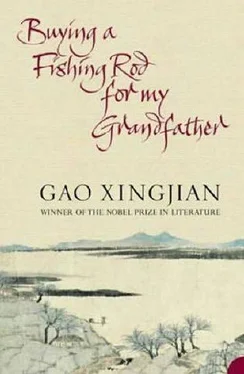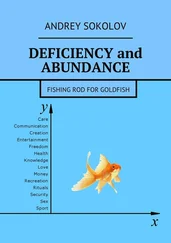I am scared stiff: these crouching Zhang the Thirds, treacherous bastards that attack from behind, are going to pounce, but I mustn't show that I'm frightened. The cunning animal at the window frame stands up like a person, resting its head on its right forepaw and watching me out of the corner of its left eye. All around, the wolves loudly smack their long tongues; they are losing patience. I recall how it was when my grandfather, as a young man, came face-to-face with a tiger in the paddy fields of his old home. Had he started to run, the tiger would have pounced and made a meal of him. However, I can neither retreat nor go forward, and can only bend quietly to feel in the earth with my hand. I find my grandfather's shotgun. Without hesitation, I raise the shotgun and slowly level it at the wolf before me. I must be like an experienced marksman, must not give them reason to think otherwise, must shoot them dead one at a time, not allowing my feet to get confused. I will start by shooting the wolf at the window, then turn left in a circle. Between each shot, I must work everything out in my mind. I can't hesitate or be careless. There were 132 goals in the 13th World Cup competition. The match is over; Argentina has beaten West Germany 3-2 and is the winner of the World Cup. I pull the trigger, and just as with the cornstalk shotgun my grandfather made for me when I was a child, the trigger breaks. The wolves roar with laughter, hooting and guffawing. Joyful shouts crash like waves at the Azteca Stadium in Mexico City, each wave higher. I am embarrassed, but I know that the danger has passed. These Zhang the Thirds are only people dressed as wolves, playacting. Look, the players have been surrounded like heroes and are being lifted over everyone's heads. They're protecting Maradona, and he is saying, "Let me kiss all the children of the world." I hear my wife talking, and her aunt and uncle, who have come from far away. The soccer match, broadcast from early morning, is finished. I should get up to see if that ten-piece fiberglass fishing rod that I bought for my grandfather, who died long ago, is still on top of the toilet tank.
18 July1986, Beijing
He is alone, with his back to the sea, sitting in a canvas deck chair on the beach. There's a strong wind. The sky is very bright, without a trace of any cloud, and in the dazzling sunlight reflected against the sea, his face can't be seen clearly.
Big iron doors wet and streaked with rust, water from the top somewhere keeps dripping. The thick, heavy doors slowly open to either side and the gap in the middle widens. Police car sirens can be heard. Through the gap in the doors are towering buildings that block off the sun. One police car after another, and the nonstop sound of sirens.
In the dark passageway of the hall is a woman's back. Without switching on the light, she puts on an overcoat, hesitates, and puts her hand on the knob. She quietly opens the door and goes out. The knob turns softly and clicks as the door shuts.
The warm sun makes him drowsy. He closes his book, leans back in the chair, and puts on sunglasses: the two round lenses screen his eyes from the sunlight. Afterward, he covers his face with a broad-brimmed black hat, and he can hear nothing but the noisy waves of the sea.
The tide surges onto the beach, but before it can recede, the sand soaks it up with a long hiss, so that all that is left is a line of yellowish froth.
His arms, hanging down, start to itch. Ants – first one, then one after another – are crawling up his arms.
She says when she made love with two men in front of the fire, it was very exciting. She is lying across the bed with her head to one side, eyes closed, outside the circle of light. The light is shining only on her long hair, and on her underwear and panty hose on the floor.
He senses the tide swelling. The seawater surges around the legs of the chair, swirls around, then recedes. An old tune fills the air. Beautiful and sad, it is like the wailing of a peasant woman at a funeral, and yet like the sobbing of a reed pipe.
She moves her ankles to kick off her shoes and bends to put on a new pair. A shoe with the heel worn to the quick lies discarded at the side of the passageway near the door.
A poster with a black-and-white photograph shows just the lower half of a woman holding up her long skirt and revealing her beautiful legs. She is standing on her toes. This is another advertisement for shoes, posted on the wall of the platform in the subway station. An old woman with a big empty bag is standing on the platform, a middle-aged man sitting on a bench is reading a newspaper. The train comes; some doors open and some don't. The people getting off head for the exit, and no one so much as looks at the advertisement. With his back turned, he is the only person left on the platform, and as others start to arrive, that back departs.
The legs of the deck chair are already immersed in the lapping water and the sea keeps rising. That sad tune is still playing, but it has become somewhat vague and sounds more like a reed pipe.
She says she wants a man twice her weight to bear down on her. In the dark she is lying on the bed, her eyes wide open. He is sitting at the desk, bare-chested, and without turning he asks if she will cope. She says she loves being squashed until she can't breathe and, having said this, she laughs. Doo – it's the computer.
The tune becomes louder and louder, yet more vague as well. It sounds like the wind tearing the paper used for windows, but with the grating of grains of sand mixed in. The tune becomes more vague, yet still hurts the ears a little. The sea has risen to the seat of the deck chair and it is swaying.
He is sitting at the computer with a cigarette in his mouth. A long sentence appears on the screen. "What" is not to understand and "what" is to understand or not is not to understand that even when "what" is understood, it is not understood, for "what" is to understand and "what" is not to understand, "what" is "what" and "is not" is "is not," and so is not to understand not wanting to understand or simply not understanding why "what" needs to be understood or whether "what" can be understood, and also it is not understood whether "what" is really not understood or that it simply hasn't been rendered so that it can be understood or is really understood but that there is a pretense not to understand or a refusal to try to understand or is pretending to want to understand yet deliberately not understanding or actually trying unsuccessfully to understand, then so what if it's not understood and if it's not understood, then why go to all this trouble of wanting to understand it -
A white-nosed clown in a circus troupe is playing an accordion, pulling and squeezing, pulling and pulling, squeezing and squeezing. He pulls the accordion out fully, gives a hard jerk, breaks the sound box, and the music instantly stops.
In the air, there is only the sound of the wind, the noisy waves of the sea, and the brilliant sunlight.
The ash on the cigarette is about to drop and, flicking it into the ashtray, he deletes each of the words of the uncompleted sentence one at a time.
A pair of hands shuffles a pile of mah-jongg tiles, takes one, feels it; it's a "middle," then there's a "develop," and a "white," and these are put in the sequence "middle" "develop" "white." Next to be picked up are "develop" "middle" "white" "develop" "middle" "white" "east" "develop" "middle" "wind" "north" "east" "south" "wind" "west" "north" "bamboo no. 2" – he pushes over the tiles and starts shuffling them again.
"Tell me a story!" He turns around and the table lamp shines on the back of his head, and in the dark, on the bed, he sees her naked body curled up like a fish.
An empty chair is floating serenely on the water, as ripples of light are reflected on the waves. The sound of the tide can't be heard; only a long note vibrates in the air, sustained and monotonous.
Читать дальше
Конец ознакомительного отрывка
Купить книгу












